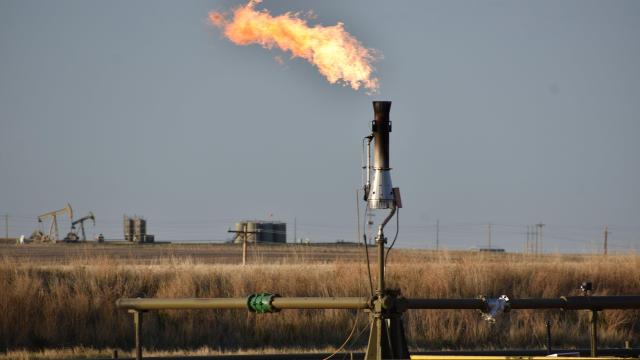Measurements taken by the National Oceanic and Atmospheric Administration show that methane, one of the most potent greenhouse gases, is rising at a rate faster than any other time in recorded history. Great!
According to NOAA, methane levels jumped 17 parts per billion (ppb) in 2021 — the single largest jump in a year since scientists started recording methane levels in the atmosphere back in 1983.
This significantly outpaces 2020’s already scary record, when methane rose 15.3 ppb. The amount of methane in the atmosphere now, according to NOAA, hovers around an average of 1,895.7 ppb — 163% more than preindustrial levels, and 15% higher than they were between 1984 and 2006.
“Our data show that global emissions continue to move in the wrong direction at a rapid pace,” NOAA Administrator Rick Spinrad said in a statement. “The evidence is consistent, alarming and undeniable.”
Methane only stays in the atmosphere for around 12 years — unlike carbon dioxide, which sticks around for much longer — making it less important to consider for longer-term warming scenarios. But it packs a pretty big punch while it’s up there: it’s more than 86 times more potent than CO2 over a 20-year period, meaning it can wreak a lot of havoc in a relatively short amount of time. As the impacts of climate change keep mounting, it’s becoming increasingly clear that one of the first steps to getting our runaway emissions under control is figuring out how to cut methane emissions and slow down some of the crazy warming we’re seeing in the short-term.
“Reducing methane emissions is an important tool we can use right now to lessen the impacts of climate change in the near-term, and rapidly reduce the rate of warming,” Spinrad said.
Not to be outshone by its more potent younger cousin, NOAA reported that CO2 also took a jump up last year. In 2021, the global surface average measurement for CO2 was 414.7 parts per million (ppm), a leap up from the 2020 average of 412.5 ppm. This is another worrisome milestone: over the past 10 years, CO2 levels have increased by more than 2 ppm each year — the biggest rate of increase since those measurements began in 1958. Daily CO2 measurements also reached some shocking individual milestones last year, including hitting more than 421 ppm during a day in April; the last time atmospheric CO2 was that high, in the Pliocene era, the Arctic was lush and forested.
The new numbers come on the heels of the incredibly urgent IPCC report released earlier this week that lays out some hard truths about the actions we need to start taking in order to keep warming below catastrophic levels. In addition to tough orders like figuring out ways to peak CO2 emissions in three years, the report also calls for cutting methane emissions 34% by the end of the decade.
Fortunately, methane is probably one of the easiest climate problems to solve, in part because we know where a lot of man-made methane comes from (primarily agriculture and oil and gas) and we’ve got a lot of technology at hand that can help solve the problems. But it’s undeniable that methane is also on the rise: NOAA recorded levels of 8.5 ppb in 2018 and 10.7 ppb in 2019. These new numbers show that even though we may have a lot of tools to solve our greenhouse gas addiction, we’re lagging behind in actually acting on solutions — and are seeing a worrisome upward trend as a result.
“We need to build a Climate Ready Nation to adapt for what’s already here and prepare for what’s to come,” Spinrad said. “At the same time, we can no longer afford to delay urgent and effective action needed to address the cause of the problem — greenhouse gas pollution.”
